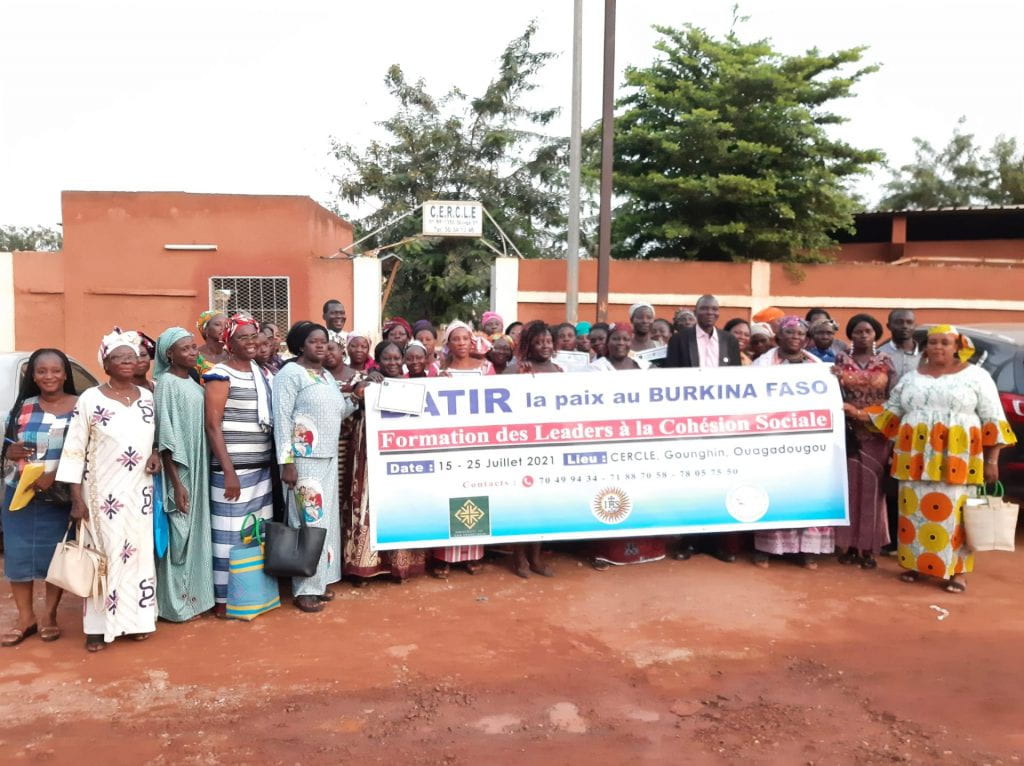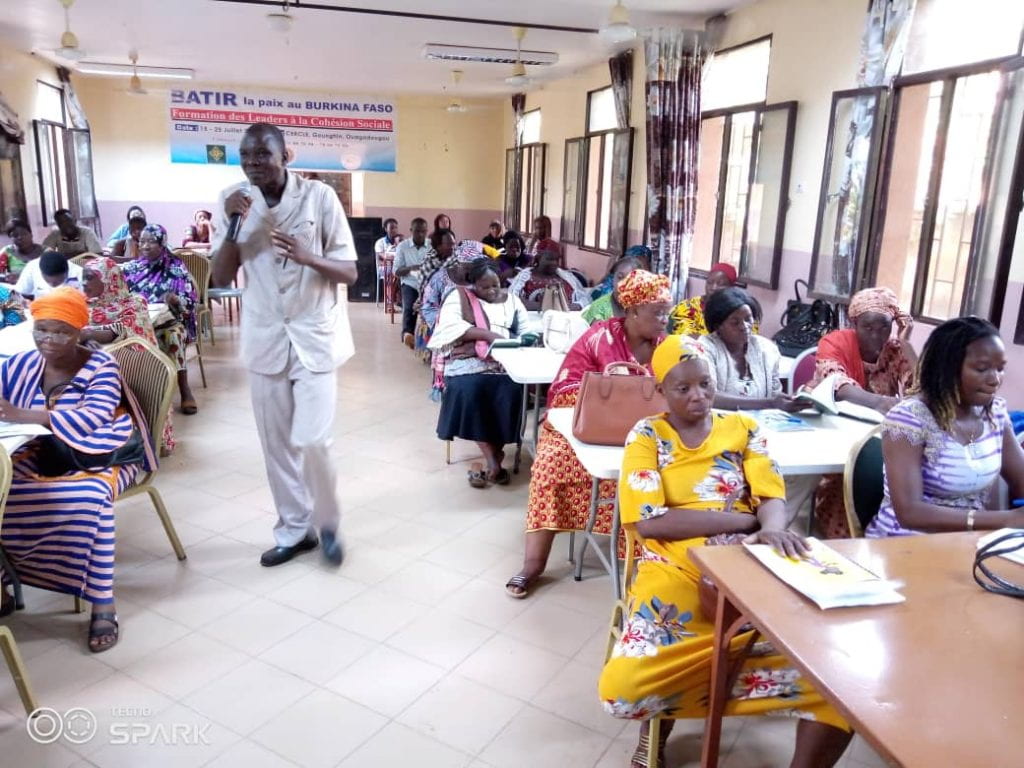
Barwendé Médard Sané, Ouagadougou, Burkina Faso, July 2021
The USF Institute for Nonviolence and Social Justice is proud to announce our first international initiative. Fr. Barwendé Médard Sané, the institute’s first Jesuit Graduate Fellow, has developed a teaching and training program for West Africa, especially in the light of the political and humanitarian crisis in the region. Representing our institute,
Fr. Sané has launched his program (“Contributing to Peace in Africa through Nonviolence Training and Capacity Building of Community and Religious Leaders”, or “CPA project”) in Ouagadougou, Burkina Faso, and he will soon bring the program to Cotonou, Benin. The program consists of rigorous training workshops for community leaders in nonviolence, conflict resolution, consensus building and peace-making based on the principles of nonviolence identified and practiced by Dr. Martin Luther King, Jr., and Fr. Sané’s manual for peace education and nonviolence training, Manuel d’éducation à la paix à l’usage des formateurs en Centrafrique, (Bangui, Éditions-jésuites-CCU, 2018).
Why are we pursuing an international strategy?
The USF Institute for Nonviolence and Social Justice, and our Founding Director Dr. Clarence B. Jones, has consistently highlighted Martin Luther King, Jr.’s understanding that the Black Freedom Movement in the US, and nonviolent anti-colonial movements throughout the developing world, were part of the same global struggle for freedom, justice and equality. This is why the liberation struggles in India, Ghana, Rhodesia, South Africa and many other countries were of great concern to Dr. King, and why he traveled to Africa in March 1957 to celebrate Ghana’s independence from England, and to meet with Kwame Nkrumah. the nation’s foremost liberation activist and its first Prime Minister. In Accra for the independence and inauguration ceremony, Dr. King met with then Vice President Richard Nixon; he told Nixon, “I want you to come visit us down in Alabama where we are seeking the same kind of freedom the Gold Coast is celebrating.”
I encourage everyone to read Dr. King’s powerful sermon “The Birth of a New Nation” he delivered at Dexter Avenue Baptist Church in Montgomery Alabama on April 7, immediately upon his return from Ghana, emphasizing the unity between the freedom struggle in the U.S. and in Africa.
I also encourage you to read the the Stanford MLK Institute’s King Encyclopedia entry on “Apartheid,” Dr. King’s longstanding activism to fight racial injustice and oppression in South Africa, and his understanding that “Colonialism and segregation are nearly synonymous … because their common end is economic exploitation, political domination, and the debasing of human personality” (28 November 1962).
Dr. Bernard Lafayette, a close friend of our institute, was a young activist for Martin Luther King’s Southern Christian Leadership Conference, and national coordinator for the SCLC’s Poor People’s Campaign, on April 4, 1968. Walking out of Dr. King’s room at the Lorraine Motel in Memphis Tennessee, King told him:
“Now, Bernard, the next movement we’re going to have is to institutionalize and internationalize nonviolence” (source). Five hours later, Dr. King was assassinated. Over more than five decades since that day, Dr. Lafayette has been working to accomplish what he regards as his “final marching orders” from Dr. King. We at the USF Institute for Nonviolence and Social Justice are committed to following the path.
Why are we launching our first international initiative in Burkina Faso and Benin?
Communities in Burkina Faso and Benin are suffering terrorist attacks and other forms of political and communal violence in the northern part of each country, as in the entire Sahel region, including Mali, Mauritania, Burkina Faso, Niger and Chad, violence that is increasingly threatening the coastal countries like Benin, Togo, and Côte d’Ivoire. Thousands of people have been killed or displaced. Generated by armed groups linked to ISIL (ISIS), al-Qaeda and other militant jihadist organizations, jihadist attacks have reached a large portion of this part of Africa for much of the past decade, sparking a major humanitarian crisis. Ignorance, poverty and unemployment are the main components making the Sahel a fertile ground for terrorism. To address this issue, troops from concerned countries backed by other troops from the European Union, the United Nations, and the United States are deployed. Unfortunately, the outcomes are disappointing. Military response to the crisis has shown limits.
We believe that peace can only be restored and sustained through processes of dialogue, civil society and community leader education, human rights and good governance:
The governance crisis that lies at the root of the Sahel’s problems is prompting growing hostility toward governments, whether expressed in rural insurgency or urban protest. A new approach, flowing from that new narrative, would not entail throwing out the current multidimensional strategy but reordering priorities. It would emphasize, first, local dialogue as a means of presaging the state’s return to rural areas, and, secondly, wider governance reform. Outside actors should encourage states to step up efforts to broker truces between warring local factions and calm disputes among and within communities and between them and state actors.
The CPA project responds to the needs for sustainable and efficient solutions to the Sahel problem focusing on new priorities, including local dialogue between rival ethnic groups, capacity building of rural leaders as a means of increasing their leadership, governance reforms, education and health care in poor areas. In this way, the CPA project engages communities impacted by violence in nonviolence training and dialogue strategies aimed to reduce violence, address trauma, and promote peaceful dialogue. The CPA project is aligned with expert analysis concluding that local mediation and peace-building initiatives, outreach to communities and engagement of militant leaders are the best solutions to reduce violence in Burkina Faso and in Benin.
Fr. Sané worked with religious and community organizations to identify community leaders who have been selected for their leadership to participate in the workshops in both countries. Most of these leaders are already committed to assisting their communities and the workshops will enforce their capacities. Five workshops will be organized in Ouagadougou and in Cotonou for different groups. A hundred people will benefit from the program and surveys will be made later to assess the implementations of the lessons.
Finally, we are pursuing this strategy in Burkina Faso and Benin because Fr. Sané has the unique expertise, regional reputation, and deep network of relationships with religious and community leaders in both countries necessary to make the initiative a success, with the ability to impact many communities, and save lives.

Barwendé Médard Sané, Ouagadougou, Burkina Faso, July 2021
We will be back in touch shortly with further status reports and photographs from the field.
Jonathan D. Greenberg and Fr. Barwendé Sané
